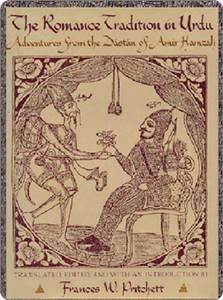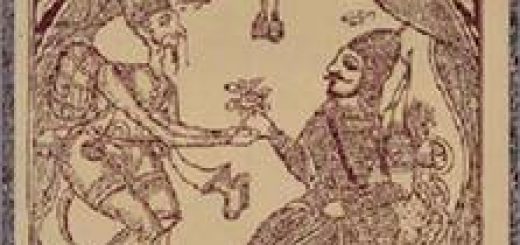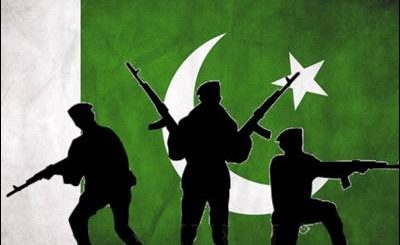Chapter 14: Landhaur makes war on the Sahib-qiran, and is finally subdued by this world-conqueror.
FOURTEEN – Landhaur makes war on the Sahib-qiran, and is finally subdued by this world-conqueror.
Hamzah went up on a mountain and prayed at the tomb of Hazrat Adam. Adam himself appeared, and gave Hamzah an armband which would make it impossible for any foe to overcome him and would cause his sword-blows to reach the head of any foe, even one a thousand yards tall. He also instructed Hamzah in the rules of chivalrous warfare: he must never attack anyone until he himself had been attacked three times, and must never use his battle-cry unnecessarily, since it was so powerful. On these terms, Adam gave Hamzah his blessing.
After a time, ‘Amar went in disguise to Landhaur’s court, knocked him and his nobles out with drugged wine, and stole many jewels and other valuables by emptying them into Zanbil. When Hamzah realized ‘Amar’s trick, he sent back the valuables to Landhaur with a graceful message of apology. Landhaur replied that he forgave ‘Amar the trick, and did not want the valuables back, but would like to see ‘Amar in his true form. ‘Amar went to his court again, but tricked him still more cleverly, stealing even his royal robes. Landhaur, however, admired ‘Amar’s skill, and was too generous to bear a grudge.
Finally Landhaur visited Hamzah’s camp. ‘Amar was on his good behavior, and entertained them both with his music. Hamzah and Landhaur were very much drawn to each other.
The Sahib-qiran and Landhaur talked in confidence, they had an affectionate and sincere conversation. When the King of the East entered his tent in the West, the King of Hindustan, while taking leave of the Sahib-qiran, said, “Has my petition been granted, or not? Has my prayer found acceptance, or not?” Hamzah said, “You fulfill all the obligations of friendship, and by your fine courtesy place me in your debt. And yet the King of Kings of the Seven Realms has sent me to fight you–it’s a strange kind of duress!”
Landhaur said, “Please abandon this intention–is not peace more gratifying than war? Forget about all this! In real fact Naushervan has sent you not to fight me, but to risk your life in a contrived battle. It’s apparent that he is your enemy. When he couldn’t subjugate you, he devised this scheme and did this to you. I beg that you take me back with you, and give up this intention. I will kill him and establish you on the throne. You will rule in comfort, and night and day, with your beloved in your arms, you will do full justice to the claims of enjoyment with her.” The Amir said, “I have taken up the challenge, and sworn to kill you. How can I break my faith with the king, how can this be?”
Landhaur drew his sword, and placed it before the Amir; bowing his head, he said, “If such is your pleasure, then please do so: please cut off this hapless one’s head. Take it without pain or hardship, and place it before Naushervan.” The Sahib-qiran pressed Landhaur’s head to his bosom, and praised his chivalry and courage, and thus made him very happy. But the Amir said, “That would be a task for executioners or cowards. Have the war-drum sounded, and betake yourself in the morning to the battlefield. On the battlefield, whatever will be, will be, and then we’ll see.”
Landhaur said, “Well then, farewell. If such is your pleasure, please have the war-drum sounded today, and alert your army.” The Amir said, “Please first order the war-drum to be sounded in your own camp. You yourself please take the first step; then I will also give the order, and will prepare for battle.” The king, under duress, went back to his own army and had the war-drum sounded. The Sahib-qiran too, hearing the sound of his war-drum, ordered the Drum of Alexander to be beaten. The drumstick fell on the drum; the earth of the battlefield trembled.
When the coming of the Ruler of the East was heralded, and the banners of the sun’s rays glittered, on the one side the Sahib-qiran, after offering the pre-dawn prayer, with his army of fighters for the faith, radiant like angels, of exemplary virtue, pure-hearted, sweet-natured; and on the other side Landhaur bin Sa’dan, the wanderer in the wilderness of misguidedness, formed their ranks on the battlefield.
The armies on both sides prepared for battle and combat. The axe-men cleared the field of shrubbery and underbrush. The shovelers made high and low places in the ground smooth and clean. The water-carriers, fitting sprayers to the mouths of their waterskins, wetted down the dust of the field; in verdancy and freshness they made it the envy of Paradise. The right flank and the left flank, center and wings, extremities and ambushes, the forward vanguard and the final rearguard, etc.–fourteen ranks were arrayed on each side. On the battlefield, the armies of both sides arranged themselves with marvelous elegance.
. . . . . . .
The first day’s fighting involved a combat between Landhaur and Gustahm; it was instigated by ‘Amar, who encouraged Gustahm by describing the fruits of victory. Gustahm attacked Landhaur, hoping to win the prize of battle, Mihr Nigar, for himself. But Landhaur overcame him, and he fled the field. Night was at hand, and fighting ended for the day.
Now comes the dastan of the battle of Hindustan, the description of the attacks of two lions of the jungle of courage and bravery. Gustahm, having had his ribs crushed by Landhaur’s mace, preferred flight over fight; running from the battlefield, he went to skulk in the valleys of the foothills. But in the Sahib-qiran’s army, the warriors enlivened the night as they had the previous night: they prayed to the Granter of Prayers to protect their honor and reputation. This noise and bustle continued in both armies; they continually talked about such things.
When King Day, overthrowing his enemy Night, forced him to flee from the field of visibility, and raised the banner of light in the land of the sky, the Sahib-qiran himself donned his helmet, coat of mail, shoulder-guards, padded silken shirt, steel corselet, foot-guards, thigh-guards, and takori. He placed his keenly-honed sword in his sword-belt, slung his light-flashing dagger at his waist, and mounted Black Constellation. The heralds and mace-bearers, saying “In the name of God,” began to pray for victory and success. The Amir, putting his quiver in a weapons-belt on one shoulder, placed his heavy mace on the other; in him the glory of the Provider’s power became visible. He took in hand a spear which called to mind the length of lovers’ sighs and beloveds’ tresses. Tauq bin Haran raised the serpent-shaped standard high over his head.
On one side was Muqbil the Faithful, on the other side Sultan Bakht the brave. In the vanguard the famous runner, the dagger-wielder, the beheader of magicians, the shaver of infidels’ beards, Khvajah ‘Amar ‘Ayyar in a circle of twelve hundred ‘ayyars, wearing his gold-embroidered vest, with his broadcloth socks on his feet; with his ‘ayyari-sling, his bundles of nooses in loop after loop, his snare which entangles enemies’ lives; wearing falconer’s greased gloves on his hands; with his malicious tricks, his scimitar that flashed like lightning, his slashing dagger in his belt; shaping with his mouth six high notes, twelve tones, twenty-four melodies, twenty-eight improvisations, he went leaping and bounding along. Thirty thousand armored horsemen, like a river of steel, formed into rank on rank, rode along with the renowned Amir.
From the other direction the King of Hindustan, Landhaur bin Sa’dan, clad in chain mail, mounted his elephant Maimunah and hastily took in his train seven hundred thousand bloodthirsty horsemen: Khamaci, Sindhi, Bengali, Karnataki, Maratha, Dakhani, Gujarati, Rangar, Bhil, Siyar, Aghori, Ka’in, Bhojpuri, Bundela, Rajput, Madrasi, Assamese, Bunaki, Bhutanese covered with steel armor, Bis from Biswara, Chatri from the land of Avadh, Thakur, Dichit, Panwar, Brahman, Shukla, Tiwari, Pande, Dube, Caube, Bhusre; rustics. They carried weapons, knives, daggers, scimitars, swords, cudgels, broadswords, hand-guns, carbines, pistols, lances, javelins.
When both armies assembled in the battlefield, wave after wave, troop after troop, squad after squad, group after group, body after body, band by band, rank by rank, and aligned themselves and stood in rows, the Angel of Death pitched his tent between the two armies, and Mars appeared in radiance on every hero’s forehead.
The Sahib-qiran grasped his horse’s reins, and spurred him sharply, and like a roaring lion dashed up to confront Landhaur, and brought this speech to his grace-conveying tongue: “Oh King Landhaur, I have business with you, and you with me. What’s the point of spilling the blood of others of the Lord’s creatures? This is a point to consider. Use whatever weapon you are expert in, and attack me; satisfy your heart’s desire.”
Landhaur said, “Oh Sahib-qiran, if I make the first attack, your own heart’s desire will remain unexpressed, your own object will not be fulfilled. You make the first attack, and show your mettle.” The Sahib-qiran said, “My teacher did not teach me such behavior. Until you attack me three times, I will not attack; I will not raise a hand against you.”
Since Landhaur was devoted to the Sahib-qiran, he did not touch his mace: he thrust with his spear at the Sahib-qiran. The Sahib-qiran blocked the spearhead with his own spearhead, and they began a spear-fight with each other. When they had each dealt a hundred spear-thrusts, and neither had been wounded, and their horses too were drenched in sweat, the Sahib-qiran, blocking Landhaur’s spear, gave it such a twist that it was knocked from his hand and fell far away; it flashed and flew like fireworks in the air.
Shame blanched Landhaur’s face to whiteness, as though the spear-point had passed through his breast. But he pulled himself together and, feeling obliged to acknowledge such merit, said, “Oh Sahib-qiran, the Tailor of Destiny has designed the robe of spear-fighting to fit properly and trimly only on your body; the Almighty Lord has bestowed perfection in this art only on you. As I am a warrior of the battlefield of courage, from now on I will never again take a spear in my hand.”
With these words, he lifted up his mace and said, “Oh Sahib-qiran, open the door of reconciliation even now! Realize that peace is better than war. All my life my heart will be scarred with vain regret–don’t make me grieve for you!” The Amir said, “This is the time for fighting and dying, not for advice and counsel and exhortation. I’ve already said that I’m bound by my word. Now I am fulfilling Naushervan’s command. Come on, let’s see how powerful your mace is! We are still in the early rounds of our combat.”
Landhaur, under duress, knelt down, hefted his mace, and struck two blows on the Sahib-qiran’s head. The Sahib-qiran, remembering the True Protector, blocked the blows with the shield of Gurshasp, which was not at all affected. Although the Amir sweated from every pore of his body, through the grace of the protective armband given by Hazrat Adam the Amir’s arm could not be bent. Landhaur said to himself, “Everyone who has been struck by this mace has had his bones ground to powder, every part of his body has been shattered to pieces. But the Sahib-qiran hasn’t reacted at all–his brow hasn’t even been clouded!”
A second time, with his whole strength, he again wielded the mace. Although the Sahib-qiran withstood that mace-blow too as steadily as the Wall of Alexander, inwardly he felt as weak as a child. Landhaur, growing irritated, struck a third blow with his mace on the Sahib-qiran’s head, such that if it had fallen on the Pillarless Mountain, water would have burst out. The Amir withstood that blow too, but all four feet of his horse Black Constellation sank into the ground up to the shanks. The Amir was obscured by whirling clouds of dust, he was covered with dust raised from the ground by the shock of that blow.
Landhaur’s face lost its color, and involuntarily the words left his lips, “I’ve killed him, I’ve brought him down–my hands have brought low the high-handed one! But alas for the Sahib-qiran’s youth! Because of it I kept trying to dissuade him, but his vow would not let him relent.” With these words, he got down from his elephant and approached the Amir. Chafing the Amir’s arms and legs, he said, “Oh most valued lord! If you are alive, call out, and restore me to life! If you are dead, you and I will not meet till Doomsday; your death has been a devastating shock.”
The Sahib-qiran came to his senses, and waved the Whip of David above Black Constellation. His horse extricated all four hooves, and moved to a different spot, and emerged cleanly. The Amir said, “Oh King of Hindustan, whom have you killed, whom have you brought down, what high-handed one have your hands brought low? I am still here! Strike one more blow, satisfy your heart’s desire. The battle has only just begun! If the Lord guards a man’s honor, why should he be so agitated? It seems that you haven’t encountered a true warrior before, you haven’t experienced a tough battle!”
Landhaur was astonished. Getting down from his elephant, he mounted a horse, and drew from his belt a Burdwani sword, steel-blue, like quicksilver, enemy-slaying, reckless, like the counter of a perfumer’s shop/5/; with it he launched a blow at the Amir’s head. The Amir raised his ornamented shield, adorned with bosses wound with seven-colored silk, and blocked the calamitous blow with it, and said, “Oh Prince Landhaur, I have withstood five of your attacks, and what attacks they were to withstand! Now it’s my turn, it’s time for my attack, so be warned! Don’t say that you were caught off guard, or that I didn’t alert you properly!”
With these words, he spurred his horse to the side of Landhaur’s horse, seized his sword Samsam, and with complete deftness and cleverness and perfect alertness, launched a blow at the king’s head. The king, blocking the blow with his shield, sought to turn it aside and stay the Amir’s hand. But the sword, cutting through his shield as though it were soggy cheese, landed on his horse’s neck, and felled the horse. The king of Hind freed himself from the saddle, and grew furiously irritated and outraged; drawing his sword, he rushed at the Amir. The Amir said to himself, “Black Constellation must not be wounded and killed at his hands! Half my strength would be gone, and when would I get my hands on such a horse again?” With perfect dexterity he got down from his horse, and with a skilful hand-grip pulled the sword from Landhaur’s hand. He grabbed it away to one side, and flung it over toward his own army.
Landhaur closed his hands around the Amir’s neck, and the Amir seized him around the waist; both began to exert their full strength. The beholders’ knees turned to water. When the Wrestler of the Day set out for his resting-place in the west, and the Master of the Night began to enhance the skills of his students the stars, torches were lit on both sides and burned continually all night long. For three days and nights the Amir and Landhaur wrestled with each other, hand to hand, chest to chest, cheek to cheek, but neither could budge the other.
On the fourth day the Amir gave the cry, “God is great!” and jerked Landhaur up and lifted him up to his chest–but could not raise him as high as his head. He stood there holding that wrestler, who was very heavy. Releasing him, he prepared to stab him with a dagger in his proud ribs, and trample his precious life into the dust of oblivion. Landhaur seized the Amir’s hand. Then with folded hands he said, “Oh Sahib-qiran, who besides you has ever been given the strength to dislodge my wrestling-stance from the ground, and lift me up even a little way? With my whole heart and soul I agree to serve you. From now on I ally myself with you.”
The Amir clasped Landhaur to his breast, and at once prostrated himself before God in gratitude, and said, “Oh King, you are like my right arm! I will treat you as a brother and hold you dearer than life. But I have this entreaty: that you go with me to Naushervan, and make me true to my word pledged to him.” Landhaur said, “I obey your orders; wherever you command I will go. In the name of God, let’s depart, I am at your service. Please order the vanguard to proceed. I’ve already pledged my word: I have nothing to say about even this matter.”
Landhaur at once summoned the officers of his army, and presented them to the Amir, and described the station and rank, etc., of every single one. And he himself joined the Amir, and entered the Amir’s tent. The Sahib-qiran gave a great quantity of gold and jewels in charity for Landhaur’s sake. Arranging for a celebration, the Amir filled the cup of his eyes to the brim with tears of blood at the thought of Mihr Nigar. Landhaur, seeing this, realized that the Amir was thinking of Mihr Nigar. Wiping the blood-red tears with his handkerchief, Landhaur said, “Why all this tearfulness? Now the time of separation is ending, and the time of union is near.”
The Sahib-qiran, gaining control over himself, asked ‘Amar to sing. ‘Amar, settling himself respectfully on his knees, fitted the tip of the plectrum over the end of his finger and began to pluck the strings. Playing the two-stringed lute, first he showed his skill by performing a raga. Afterwards, when he began to sing as sweetly as David, he entranced the Amir, Landhaur, and all those present, whether they were love-torn or not. The Amir’s and Landhaur’s hearts were enraptured by ‘Amar’s singing. Both of them loaded him with gold and jewels in reward.
Afterwards Landhaur placed the keys of his treasury before the Amir, presenting him with rare and valuable gifts from the whole of Hind. Landhaur was ennobled by embracing Islam, and with a sincere heart renounced idol-worship. Sending for the major-domo, the cooks, and the carpet-spreaders, and causing scented leather dining-cloths to be spread out in one room, the Amir provided a banquet of various kinds of food. The Amir, taking Landhaur with him, ate dinner. Landhaur, after dinner, petitioned, “I am a suppliant for a great honor. I have been hoping for a long time that you with your Paradise-rivalling feet would make my humble home the envy of Heaven, and would be pleased, by taking bread and salt, to let the palate of my soul relish the taste of your kindness.” The Amir said, “I accept with my whole heart, I must certainly taste the food of Hindustan.”
After this, Landhaur asked leave to depart, and the Amir garbed Landhaur in a royal robe of honor. Landhaur took his leave and went to his own palace. Arranging royal festivities, he brought into his court the Sahib-qiran, along with the famous nobles and dignified champions. A joyous gathering began; slaps fell on the tabla, and it started to resound. Now I will leave Landhaur and the Amir absorbed in the festivities, and say a few words about Gustahm’s doings.








![Kuch Ishq Kiya, Kuch Kaam Kiya [Ishq Aur Kaam] - Faiz Ahmed Faiz](https://www.ravimagazine.com/wp-content/uploads/2015/03/faiz-461x245.jpg)





